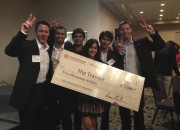So your company’s in its very early stages. We’re talking a skeleton crew of staff, minimal sales, and even less cash. While your focus is understandably on immediate survival and how you can hit your first big hurdles, what else should you be thinking of, especially where your finances are concerned?
Search Results: startup
How will you know when to revise your business plan? The short answer is that plans are living documents and should be constantly evolving. That being said, there are certain times when major, rather than incremental change, is called for. How do you distinguish between the two? Below are unmistakable signs, or forks in the road, that should prompt you to substantially rethink your plan.
We’ve all heard some variation of the quip that overnight success actually involves years of striving, with presumably several failed efforts and false starts along the way. But when entrepreneurs experience failure, whether it’s their first encounter with it or an especially spectacular failure, it can be a major blow financially as well as emotionally. Here are my thoughts on how to recover from a significant business setback.
We recently sat down with Luc Berlin, co-founder of Miigle, a SoCal startup that has an aggressive global mission to bring entrepreneurs together from around the world. We first interviewed Luc in 2012, just as he was launching the prototype for Miigle. We followed up with Luc to see just how he’s been managing the entrepreneurial waters. On the day of Miigle’s public launch, we chatted about developing his team, lessons learned, and how World Cup soccer fits into his vision.
Earlier this week, we gave a comprehensive breakdown of the 29 companies with a preview of Batch 8 Demo Day. Today, we’ll be presenting our favorite ten of the day in ABC order. Bear in mind, we’re going to keep the financial specs under wraps (just tiny hints), but overall, Batch 8 performed very strongly across the board.
For top tier programs, there is a compelling combination of promise and mystique that creates a unique drive for entrepreneurs, who once accepted, become ready to put life circumstances on hold during program durations to grow their startups. The difference here, is the quick injection of capital and guidance to create bullet train-like growth.
The company was founded in 2012, developed by an all-Trojan team and has already made a big splash with this first-of-its-kind travel website. It was a finalist in Marshall’s New Venture Seed Competition and it has earned a place within IncubatriX, a startup Incubator through USC’s Grief School of Entrepreneurship, which currently houses over a dozen USC startups.
The very mention of the word fundraising can illicit some powerful emotions among entrepreneurs. It’s frustrating, taxing; a full time job in itself. And those who have gone through the process, know. Fundraising is a complex dance with a distinct, dichotomous tone. On one end, entrepreneurs who have (at minimum) built something customers love and are willing to pay for, and the other hand, investors who are looking for the very companies who fit that profile.





















